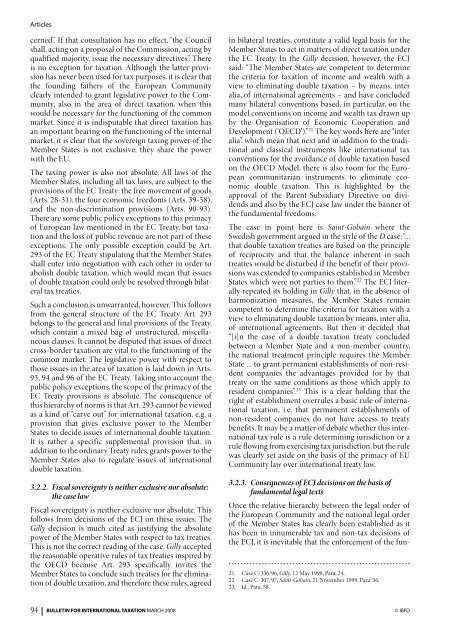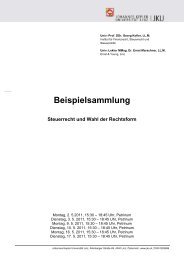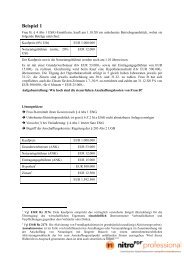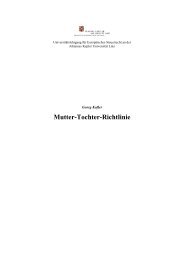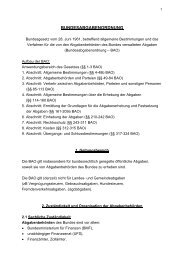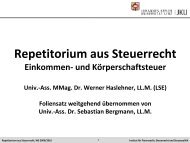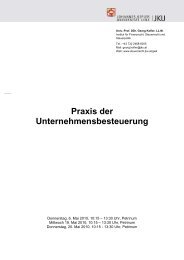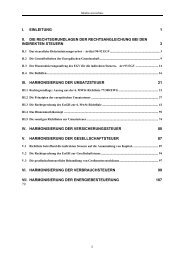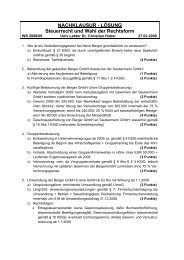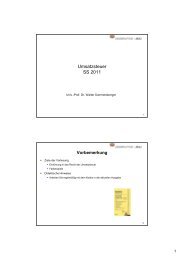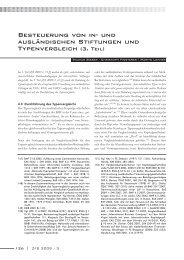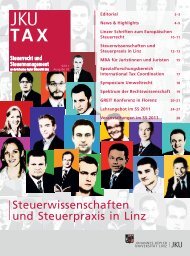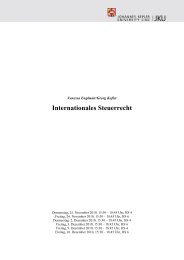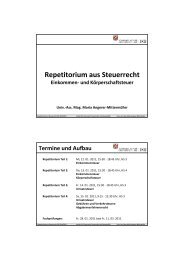European Tax Law - JKU
European Tax Law - JKU
European Tax Law - JKU
Sie wollen auch ein ePaper? Erhöhen Sie die Reichweite Ihrer Titel.
YUMPU macht aus Druck-PDFs automatisch weboptimierte ePaper, die Google liebt.
Articles<br />
cerned”. If that consultation has no effect, “the Council<br />
shall, acting on a proposal of the Commission, acting by<br />
qualified majority, issue the necessary directives”. There<br />
is no exception for taxation. Although the latter provision<br />
has never been used for tax purposes, it is clear that<br />
the founding fathers of the <strong>European</strong> Community<br />
clearly intended to grant legislative power to the Community,<br />
also in the area of direct taxation, when this<br />
would be necessary for the functioning of the common<br />
market. Since it is indisputable that direct taxation has<br />
an important bearing on the functioning of the internal<br />
market, it is clear that the sovereign taxing power of the<br />
Member States is not exclusive; they share the power<br />
with the EU.<br />
The taxing power is also not absolute. All laws of the<br />
Member States, including all tax laws, are subject to the<br />
provisions of the EC Treaty: the free movement of goods<br />
(Arts. 28-31), the four economic freedoms (Arts. 39-58),<br />
and the non-discrimination provisions (Arts. 90-93).<br />
There are some public policy exceptions to this primacy<br />
of <strong>European</strong> law mentioned in the EC Treaty, but taxation<br />
and the loss of public revenue are not part of these<br />
exceptions. The only possible exception could be Art.<br />
293 of the EC Treaty stipulating that the Member States<br />
shall enter into negotiation with each other in order to<br />
abolish double taxation, which would mean that issues<br />
of double taxation could only be resolved through bilateral<br />
tax treaties.<br />
Such a conclusion is unwarranted, however. This follows<br />
from the general structure of the EC Treaty. Art. 293<br />
belongs to the general and final provisions of the Treaty,<br />
which contain a mixed bag of unstructured, miscellaneous<br />
clauses. It cannot be disputed that issues of direct<br />
cross-border taxation are vital to the functioning of the<br />
common market. The legislative power with respect to<br />
those issues in the area of taxation is laid down in Arts.<br />
93, 94 and 96 of the EC Treaty. Taking into account the<br />
public policy exceptions, the scope of the primacy of the<br />
EC Treaty provisions is absolute. The consequence of<br />
this hierarchy of norms is that Art. 293 cannot be viewed<br />
as a kind of “carve out” for international taxation, e.g. a<br />
provision that gives exclusive power to the Member<br />
States to decide issues of international double taxation.<br />
It is rather a specific supplemental provision that, in<br />
addition to the ordinary Treaty rules, grants power to the<br />
Member States also to regulate issues of international<br />
double taxation.<br />
3.2.2. Fiscal sovereignty is neither exclusive nor absolute:<br />
the case law<br />
Fiscal sovereignty is neither exclusive nor absolute. This<br />
follows from decisions of the ECJ on these issues. The<br />
Gilly decision is much cited as justifying the absolute<br />
power of the Member States with respect to tax treaties.<br />
This is not the correct reading of the case. Gilly accepted<br />
the reasonable operative rules of tax treaties inspired by<br />
the OECD because Art. 293 specifically invites the<br />
Member States to conclude such treaties for the elimination<br />
of double taxation, and therefore these rules, agreed<br />
in bilateral treaties, constitute a valid legal basis for the<br />
Member States to act in matters of direct taxation under<br />
the EC Treaty. In the Gilly decision, however, the ECJ<br />
said: “The Member States are competent to determine<br />
the criteria for taxation of income and wealth with a<br />
view to eliminating double taxation – by means, inter<br />
alia, of international agreements – and have concluded<br />
many bilateral conventions based, in particular, on the<br />
model conventions on income and wealth tax drawn up<br />
by the Organisation of Economic Cooperation and<br />
Development (‘OECD’).” 21 The key words here are “inter<br />
alia”, which mean that next and in addition to the traditional<br />
and classical instruments like international tax<br />
conventions for the avoidance of double taxation based<br />
on the OECD Model, there is also room for the <strong>European</strong><br />
communitarian instruments to eliminate economic<br />
double taxation. This is highlighted by the<br />
approval of the Parent-Subsidiary Directive on dividends<br />
and also by the ECJ case law under the banner of<br />
the fundamental freedoms.<br />
The case in point here is Saint-Gobain where the<br />
Swedish government argued in the style of the D case: “...<br />
that double taxation treaties are based on the principle<br />
of reciprocity and that the balance inherent in such<br />
treaties would be disturbed if the benefit of their provisions<br />
was extended to companies established in Member<br />
States which were not parties to them.” 22 The ECJ literally<br />
repeated its holding in Gilly that, in the absence of<br />
harmonization measures, the Member States remain<br />
competent to determine the criteria for taxation with a<br />
view to eliminating double taxation by means, inter alia,<br />
of international agreements. But then it decided that<br />
“[i]n the case of a double taxation treaty concluded<br />
between a Member State and a non-member country,<br />
the national treatment principle requires the Member<br />
State ... to grant permanent establishments of non-resident<br />
companies the advantages provided for by that<br />
treaty on the same conditions as those which apply to<br />
resident companies”. 23 This is a clear holding that the<br />
right of establishment overrules a basic rule of international<br />
taxation, i.e. that permanent establishments of<br />
non-resident companies do not have access to treaty<br />
benefits. It may be a matter of debate whether this international<br />
tax rule is a rule determining jurisdiction or a<br />
rule flowing from exercising tax jurisdiction, but the rule<br />
was clearly set aside on the basis of the primacy of EU<br />
Community law over international treaty law.<br />
3.2.3. Consequences of ECJ decisions on the basis of<br />
fundamental legal texts<br />
Once the relative hierarchy between the legal order of<br />
the <strong>European</strong> Community and the national legal order<br />
of the Member States has clearly been established as it<br />
has been in innumerable tax and non-tax decisions of<br />
the ECJ, it is inevitable that the enforcement of the fun-<br />
21. Case C-336/96, Gilly, 12 May 1998, Para. 24.<br />
22. Case C-307/97, Saint-Gobain, 21 November 1999, Para. 56.<br />
23. Id., Para. 58.<br />
94 BULLETIN FOR INTERNATIONAL TAXATION MARCH 2008 © IBFD


